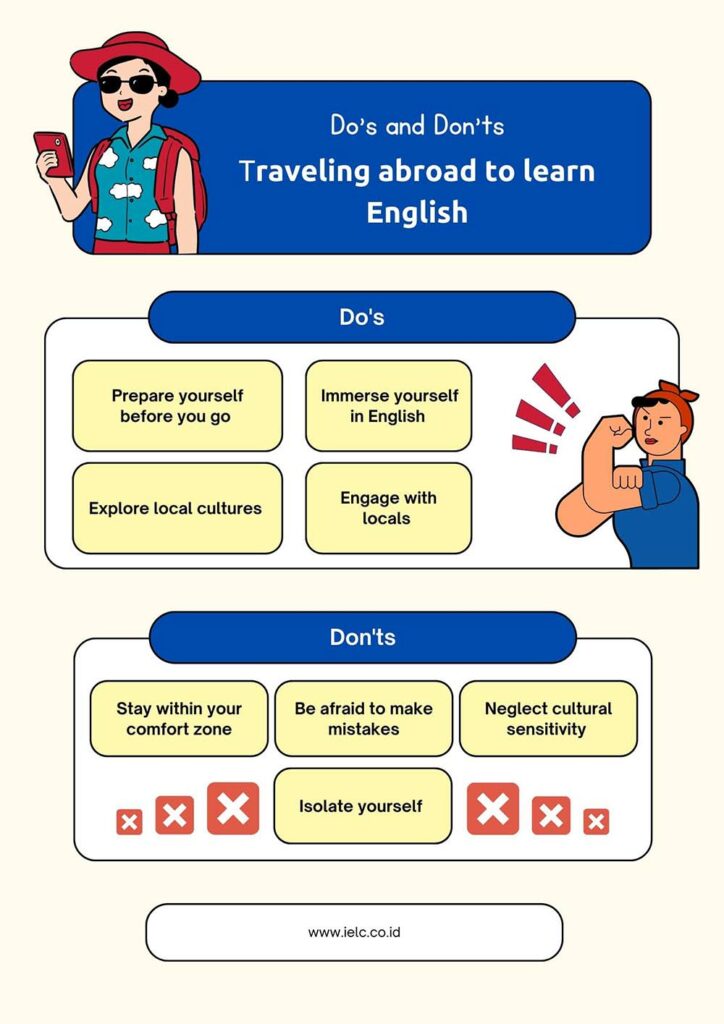
The do’s and don’ts of travelling abroad to learn English
Welcome back, learners!
Traveling abroad to learn English is a big step, and it’s just as exciting as it is daunting, isn’t it?
You’ve probably been planning for months, ticking off items on your checklist, dreaming about the places you’ll visit, the people you’ll meet, and most importantly, the leaps and bounds you’ll make in your English language journey!
But let’s face it, even the best of us can feel a little lost when it comes to setting off on this unique kind of adventure. You’re heading off into unfamiliar territory, and you want to make sure you do it right!
You might be asking yourself, “How do I make the most of my trip?”, “What’s the best way to immerse myself without feeling overwhelmed?” “How do I get out of my comfort zone?” “What common mistakes should I avoid?” In other words, what are the do’s and don’ts when you’re traveling abroad to learn English?
That’s why we’ve got your back. In this article, we’ll share the nitty-gritty, the top tips, the vital do’s and don’ts that will help make your journey to learn English abroad a roaring success. So, let’s dive right in, shall we?

Do’s:
1. Do prepare yourself before you go
Think of it as laying the groundwork for the adventure that lies ahead. It’s about ensuring you have the necessary tools and knowledge to navigate the journey successfully.
Before you leave, spend some time refreshing your existing English knowledge. This could involve reviewing basic grammar rules, common phrases, or essential vocabulary. You can also use language learning apps or online resources to brush up on your English skills.
Research about the place you are going to. Learn about the local culture, etiquette, customs, and even slang! Understanding these aspects can make your transition smoother and also help you communicate more effectively. It can also help you avoid any faux pas that could result from cultural misunderstandings!
2. Do immerse yourself
You’ve made the big decision to travel abroad to learn English, so, make the most of it! Immerse yourself in English!
Living in an English-speaking country provides an unparalleled opportunity to surround yourself with the language. This goes beyond the structured learning within the classroom. Use English as much as possible in all aspects of your daily life. This could mean asking for directions, ordering food at a restaurant, or even buying groceries.
Every conversation, no matter how simple, provides you a chance to practice and improve. So, don’t shy away from them. Rather, embrace these moments as part of your learning process. Challenge yourself to think in English, rather than translating from your native language. This can be tough initially, but it can significantly improve your fluency over time.
Remember, immersion isn’t just about language; it’s also about culture. By living the language in its cultural context, you’ll gain an understanding of English that no textbook can ever offer!
3. Do engage with locals
Interacting with native speakers provides you with a firsthand learning opportunity that no classroom or textbook can replicate!
Conversations with locals can expose you to a wide range of accents, vocabularies, phrases, and idioms that you might not encounter in a more formal learning environment.
These interactions can also offer insights into the cultural nuances of the language, which are often as important as grammar and vocabulary in effective communication!
Engaging with locals can take many forms. It can be as simple as striking up a conversation with a shopkeeper, your host, or fellow passengers on a bus. You could also participate in local activities, events, or clubs, which not only provide language practice but also enrich your understanding of the local culture!
It’s easy to feel insecure about your pronunciation, accent, or grammar when you speak with a native speaker, but don’t feel bad! Think of it this way, you can speak AT LEAST two languages, your mother tongue AND English! That’s a wonderful accomplishment already!
Ultimately, engaging with locals turns your entire journey into a language learning experience. It makes your English learning process more dynamic, interesting, and culturally rich. Plus, it can lead to some wonderful friendships, memories, and stories along the way. So, get out there, strike up conversations, and let the world be your classroom!
4. Do explore local cultures
Exploring the local culture can also enrich your vocabulary in unexpected ways. You’ll encounter words and phrases related to local food, festivals, customs, and places that might not appear in a typical language course or textbook.
Additionally, understanding local culture can make your interactions with native speakers more meaningful and enjoyable. It can help you avoid cultural misunderstandings and build deeper connections with the people you meet.
There are many ways to immerse yourself in local culture. Visit museums and cultural sites, participate in local festivals, try traditional foods, and interact with the locals as much as you can. Each of these experiences will give you a deeper understanding of the culture and, consequently, the language!
Don’ts:
1. Don’t stay within your comfort zone
Staying in your comfort zone is a common pitfall that many learners might find themselves in when they go abroad.
It can feel familiar to stick with familiar environments and to interact mainly with people from your home country, but this approach could severely limit your learning opportunities!
When you push yourself out of your comfort zone, you expose yourself to situations that challenge your English skills and prompt you to learn and adapt. It might mean striking conversation with a local, attending an event where you don’t know anyone, or navigating a situation where no one speaks your native language.
While these situations can feel intimidating, they are incredibly valuable learning experience!
Remember, it’s in these moments, when you feel slightly uncomfortable and challenged, that the most significant learning occurs. These situations demand that you use your English skills to navigate, solve problems, and connect with others. They provide practical, real-world uses for the English language that are highly beneficial for improving fluency and comprehension.
Additionally, stepping out of your comfort zone often leads to more memorable and enriching experiences. It can lead to new friendships, unexpected adventures, and a deeper understanding and appreciation of the local culture!
As they say, the regret of not taking risks is often bigger than the regret of doing nothing!
2. Don’t be afraid to make mistakes
Remember, mistakes are part of the learning process. In fact, we can confidently say that mistakes lead the way for progress!
When we make mistakes, it means we’re trying, we’re communicating, we’re learning. And yes, it might feel a little embarrassing at times, but remember that everyone who has ever learned a second language has been in your shoes!
Mistakes provide us with the opportunity to correct and learn. Every time we use the wrong word, conjugate a verb incorrectly, or mix up our sentence structure, we’re given a chance to learn what’s correct.
In fact, these little hiccups can often cement our knowledge more firmly as we’re more likely to remember the correct form after we’ve been corrected!
Furthermore, not being afraid to make mistakes often means you’re willing to take risks in your language use. This can lead to more natural, fluid communication, even if it’s not always perfect. After all, communication, not perfection, is the ultimate goal of language learning!
3. Don’t neglect cultural sensitivity
In order to not neglect cultural sensitivity, it means you must be culturally sensitive!
Being culturally sensitive means acknowledging and respecting the customs, traditions, and social norms of the place you’re in.
This might involve anything from understanding dining etiquette, to knowing which topics of conversation are considered polite or taboo, or even respecting the style of communication itself. For example, people from certain cultures might prefer a direct way of speaking, while other cultures might often use pleasantries.
It’s also important to remember that even within English-speaking countries, cultural norms can vary greatly. The culture in the UK can be quite different from the culture in the US, Australia, or South Africa. Each has its own unique customs, slang, and social etiquette.
Neglecting cultural sensitivity can lead to misunderstandings or even offend the people you’re trying to communicate with. On the other hand, showing respect and appreciation for the local culture can open doors, help you form deeper connections, and enhance your overall language learning experience.
Moreover, being culturally sensitive also helps in better understanding the language itself. Many phrases, idioms, and expressions in English have cultural connotations that you can fully comprehend only when you’re aware of the cultural context!
4. Don’t isolate yourself
Remember, learning a language is not just about the words and the grammar; it’s about people, communication, and connection!
When you isolate yourself, perhaps by spending too much time alone or only hanging out with people who speak your native language, you miss out on these valuable opportunities to practice and improve your English.
Not only does interacting with others benefit your language skills, but it also helps you to better understand the culture, customs, and way of life in the place you’re visiting. It offers insights that you can’t get from a textbook.
Lastly, making connections with locals and other travelers can also make your experience abroad more enjoyable and memorable. Friendships, cultural exchanges, and shared experiences can enrich your journey and make for great memories!
Do you want to speak English with confidence?
Most people lack confidence when they speak English. They are afraid to make mistakes and are embarrassed to speak in front of others.
This is because they have been taught English the wrong way!
Most English courses waste your time and money on useless exercises that don’t bring results. Even worse, they teach you bad habits that are very difficult to unlearn.
As a result, you become confused and lack confidence. This is wrong!
#1 English course Indonesia
Our goal is to get you speaking in English with fluency and confidence as fast as possible. We want to give you the skills you need to fulfil your potential!
Our experienced teachers will guide you along every step of the learning process to ensure that you are not wasting your time, money, and energy on useless language exercises & wrong methods.
Our course
With our modern campus and technology, we are equipped to provide the best possible courses for children, teens, and adults, including:
